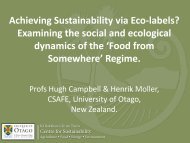Book of Abstract (incl. addendum) - IFSA symposium 2012
Book of Abstract (incl. addendum) - IFSA symposium 2012
Book of Abstract (incl. addendum) - IFSA symposium 2012
Create successful ePaper yourself
Turn your PDF publications into a flip-book with our unique Google optimized e-Paper software.
Workshop 6.1 Balancing and communicating overall assessments <strong>of</strong> food systems<br />
extent <strong>of</strong> personal and organizational impacts on human, cultural, economic and nature environment.<br />
Transdisciplinary concepts concerning ethical values and practices represent one means for thinking<br />
about “acting responsibly” and understanding that ethics are not (or should not be) “top down”, but<br />
emerge in a participatory context.<br />
We argue that strengthening self-reflexivity is a key towards a healthy agriculture, food and<br />
healthy environment that obviates the need for external controls and regulation.<br />
Organic farming and multicriteria decisions: An economic survey<br />
Tove Christensen, Søren Bøye Olsen, Alex Dubgaard and Niels Kærgård<br />
University <strong>of</strong> Copenhagen, Denmark<br />
Tove@foi.ku.dk<br />
Shifting from traditional to organic farming and food consumption might impact biodiversity, health,<br />
agricultural productivity, animal welfare, the environment, food quality and other important variables.<br />
Many <strong>of</strong> these changes involve what economists call market external effects and public goods; these<br />
are effects which are not directly paid by either the producers or the consumers in the market. From an<br />
economic point <strong>of</strong> view, these effects constitute the key justifications for public interventions in the<br />
market in the pursuit <strong>of</strong> socially optimal allocation <strong>of</strong> resources. Interventions can take the form <strong>of</strong><br />
imposing taxes, subsidies, minimum standards and even rules for public consumption. Identifications<br />
<strong>of</strong> optimal policies require that all aspects <strong>of</strong> a change are <strong>incl</strong>uded.<br />
Economists have worked with such multidimensional decision problems for decades and a<br />
number <strong>of</strong> rather effective methods have been developed. The traditional method, at least for relatively<br />
small projects is the cost-benefit method where all cost and benefits are measured in money. However,<br />
cost-benefit analyses are based on a considerable number <strong>of</strong> simplifying assumptions and less<br />
restrictive “multi criteria decision methods” have been developed. There are ongoing discussions <strong>of</strong><br />
how to design the single optimal method. This is possibly because multicriteria decision problems are<br />
on the borderline between economic science and policy. Nevertheless, economists can contribute withf<br />
methods and considerations which can make the decision making process significantly more rational<br />
and highlight the trade-<strong>of</strong>fs at stake.<br />
The paper provides an overview <strong>of</strong> the economic theory <strong>of</strong> multi criteria decision making and<br />
discusses both theoretical and practical problems related to the use <strong>of</strong> such methods. Examples <strong>of</strong><br />
studies treating traditional and organic farming are given. Interesting results are found; e.g. indications<br />
<strong>of</strong> conflicts between the benefits as perceived by consumers vs. documented by science.<br />
Stakeholders and the challenges <strong>of</strong> sustainability assessment<br />
Hugo F. Alrøe, Egon Noe, Henrik Moller and Jeppe Læssøe<br />
Aarhus University, Denmark<br />
Hugo.Alroe@djf.au.dk<br />
In order to develop better and more sustainable food systems, there is a need to make overall<br />
assessments <strong>of</strong> their effects, and to bring those assessments into practice. This paper will identify key<br />
challenges in developing and using overall assessments <strong>of</strong> the effects <strong>of</strong> food systems on the<br />
environment, nature, health and welfare, focusing on the role <strong>of</strong> actors and stakeholders in meeting<br />
these challenges. The case in question is organic food systems, but the analysis is also <strong>of</strong> broader<br />
relevance. The three pivotal challenges concern knowledge, values and communication. The first<br />
challenge is how to use and balance different types <strong>of</strong> knowledge. The effects <strong>of</strong> different<br />
developments can be assessed based on local knowledge <strong>of</strong> practices and histories, indicators on<br />
environmental presures and states, scientific system models, etc. Different sciences and different actors<br />
can provide different kinds <strong>of</strong> knowledges. Some are quantitative and precisely measured, others<br />
qualitative and narrative, some easily accessible, others costly or difficult to obtain. The second<br />
challenge is how to render values visible and bring the relevant values into the assessments. Scientific<br />
107











